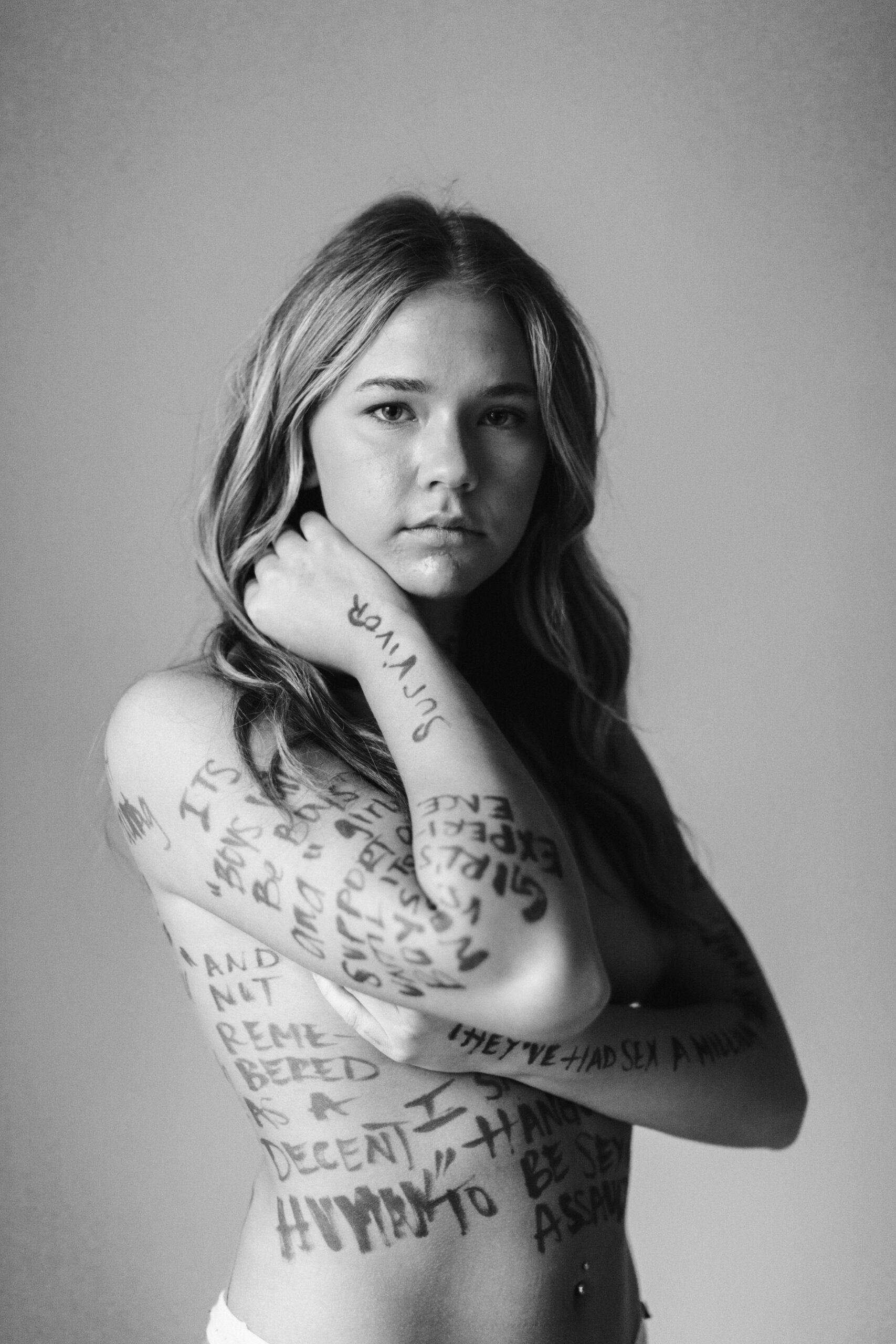November 3, 2021
Photos by Lily Dozier and Hannah Arzen
Content Warning: This content discusses sexual violence.
Photo by Lily Dozier
When Chloe turned the lights on in her friend’s bathroom, she knew something was terribly wrong. The pain in her lower region was searing, her bruises were distinct and she was bleeding.
What should’ve been an exciting impromptu tour of MU turned into a night that would change the trajectory of Chloe’s life forever.
Chloe visited MU as a prospective student at 17. In 2019, a survey organized by the Association of American Universities found that among MU undergraduates, 26.6% of women and 7.5% of men experienced nonconsensual sexual contact since entering MU.
College is promoted as the best four years of one’s life. Students find independence away from their family, make new connections and learn life skills. Each college experience is unique and can provide new and exciting opportunities. But sexual assault can rob a victim of this in an instant.
Back On Campus
Chloe has been sexually assaulted twice at MU. She is currently a junior.
Chloe had a promising start to her collegiate career. After going through sorority recruitment, receiving a bid and getting a headstart on finding friends through Summer Welcome, she had the right recipe for the best first year of college.
Then Monday, Sept. 2, 2019 rolled around.
Chloe and her friends were at George C. Brooks Hall, a residence hall on campus. While they were hanging out, one of her friends suggested going to the Alpha Gamma Sigma fraternity house to hang out. Chloe said that she was hesitant to go, but went along with her two friends because she trusted herself and them. Because of her past, Chloe was hesitant to stay, but didn’t want to leave her friend, so she decided to stick around. The pair went with a guy to his room, where two other guys were also hanging out.
“The guy took a shower and I went to sleep on his bed,” Chloe said. “He came back … and [tried] to wake me up, and I was exhausted so I said no. He [started] touching me over my clothes and it brought me back to my first situation.”
Chloe said that she continued to say no, but her assaulter persisted, despite her refusal and the fact that her friend was in the room. Eventually, Chloe gave in. She said it felt like the only way out. After learning weeks later that another girl had accused him of sexual assault in the past, Chloe cut off contact with him.
For a while after Chloe had this encounter, she didn’t classify it as rape. She felt that since she said yes, it was still consensual sex.
What matters is that her first answer was no.
Sexual coercion is classified as “unwanted sexual activity that happens when [one is] pressured, tricked, threatened or forced in a nonphysical way.” According to a survey by the CDC, in the U.S., 43.9% of women and 23.4% of men have experienced some form of sexual violence other than rape between January and December in 2011.
In the spring of 2021, nearly a year and a half after her assault, Chloe came to terms with what she had experienced.
“I hated myself for taking so long [to realize what had happened to me] … It didn’t feel like rape because I wasn’t attacked or beat up,” Chloe said.
Chloe never reported her incident, which isn’t uncommon. According to the Rape, Abuse, and Incest National Network, more than 66% of sexual violence cases go unreported.
“I didn’t reach out for help because I didn’t feel a need to,” Chloe said. “But I also sometimes wish I had because … it makes me think that [since] I didn’t say something, is he going to do it again?”
With sexual assault becoming a more prominent issue at MU, Chloe emphasized the importance of believing and supporting survivors.
“I can guarantee that someone you know or love has been assaulted, and it comes in all forms,” Chloe said. “From interpersonal to a total stranger, from [sexual harrassment] to [rape]. Just because you don’t hear it doesn’t mean it’s not happening.”
Sexual violence continues to be a problem at MU, and there’s a source that seems to continue perpetuating it: fraternities.
The Brotherhood
Chloe’s second experience with sexual violence occurred at the Alpha Gamma Sigma house.
Alpha Gamma Sigma replied to an email for comment on a sexual assault case in 2019 stating that their executive board reached out to the University of Missouri Police Department to assist in any way, but did not receive any additional information.
“Alpha Gamma Sigma takes allegations of sexual assault seriously and will always cooperate with university officials and law enforcement with any investigation,” according to a statement sent by Alpha Gamma Sigma over email., “Sexual assault has no place at AGS or anywhere in the Mizzou community.”
Photo by Hannah Arzen
“I know I shouldn’t had done it or I should’ve asked.”
Tabitha, a sophomore at MU, began her college journey in 2020. Her boyfriend at the time was a then-member of the Missouri wrestling team.
“When you’re a freshman in college, you cling to things that feel like home,” Tabitha said. “And he felt like home to me — he was like my entire life.”
Tabitha said her then-boyfriend sexually assaulted her in March 2021. He took a video of himself assaulting her while she was unconscious and intoxicated.
After the assault, Tabitha woke up to a paper note next to her from her abuser. It read verbatim:
“I’m sorry for what I did last night. The reason I did it, even though you won’t believe me, was because I feel like I doing something good when I am having sex with you; I don’t get that feeling much. I know I shouldn’t had done it or I should’ve asked. I hope you can forgive me. I love you so much & you are the only girl I want. I will never hurt you again. I love you.”
Tabitha filed a police report and submitted a rape kit after the assault. Her abuser was arrested, but his friends at MU and from his hometown started harassing Tabitha.
“My windows were smashed, notes were left on my car, I was getting text messages like every single day, people were posting on their story about me,” Tabitha said. “And I just simply didn’t understand.”
According to a 2015 survey from the Centers for Disease Control and Prevention, “In the U.S., over 1 in 3 women experienced contact sexual violence, physical violence and/or stalking by an intimate partner during their lifetime.”
The Rape, Abuse & Incest National Network website states that no matter the relationship status, engaging in sexual activity without someone’s consent is never okay.
“All of these boys were saying things to me like, ‘Well, you said yes to him once — how was he supposed to know that it wasn’t okay this time?’” Tabitha said. “Well, the difference was I was unconscious.”
Tabitha said she was always raised to believe survivors of sexual assault. She said the breakup and subsequent retaliation traumatized her. Tabitha also said that during the Columbia Police Department interview process, she felt that the officers belittled her and were unsympathetic to her situation.
In response to the harassment, Tabitha turned hate into art. She took the messages people sent her and painted them on her body next to empowering words like “SURVIVOR.” On her back, the note her abuser wrote to her is painted verbatim. Underneath, “CONSENT ONCE DOES NOT MEAN CONSENT FOREVER” is circled.
Tabitha’s abuser was jailed for several months and then released on a $200,000 bond. He is now under house arrest in the town right next to Tabitha’s hometown. He works in Springfield, Missouri, where Tabitha also spends a lot of time when she’s at home. She said that judges reasoned he would not be in Columbia, but never considered that they practically live in the same town when she’s not in school.
Missouri wrestling wrote in an email that as of November 2020, Tabitha’s abuser is no longer a member of the team and Mizzou Athletics.
Tabitha’s legal battles are ongoing with uncertainty as to how they will end. She said she owes her perseverance throughout the experience to her upbringing in a single-mom household.
“I’ve always just grown up with the idea I can do anything I set my mind to,” Tabitha said.
She said her sorority, Kappa Kappa Gamma, the Office for Civil Rights and Title IX and True North, an organization that support victims of domestic and sexual assault, have also been very helpful and supportive throughout her experience. Title IX meets with her weekly and worked with her professors after the assault to give her academic leniency. True North paired her with an advocate who provides advice and attends court with her.
“One thing my True North advocate used to always tell me is, ‘You should be able to walk into the Student Center naked and not be sexually assaulted — you signed up for a hangover, not to be sexually assaulted,’” Tabitha said.
Tabitha is partnering with True North to display her photo project from April 4-8, 2022, at the Columbia Art League. She said all proceeds will go to support sexual assault survivors.
The Future
Between 2015 and 2020, there have been 680 reports of sexual misconduct that have been submitted to OCRT9, an information system for students who have violated MU policy. 181 claims of sexual exploitation have also been reported as well.
“[The MU administration] needs to do better at being a safe place for survivors and students, and Greek Life needs to advocate for survivors and take a stance against [sexual violence],” Chloe said. “We need to have these conversations because consent is vital for every relationship you have with someone.”
If you are an MU student struggling to report a sexual violence incident, there are multiple resources available to help with receiving the help you need.
For university-based services, the Relationship and Sexual Violence Prevention Center supports students emotionally while also providing legal and educational services, and can be reached at 573-882-6638.
Students can report incidents of sexual violence to the Office of Civil Rights and Title IX via phone at 573-882-3880, email at civilrights-titleix@missouri.edu or an online reporting form found on their website.
True North offers 24/7 shelters and hotlines, emotional and legal support and hospital advocacy. Their phone number is 573-875-1370 and their hotline number is 800-548-2480.
Studies have shown that rape victims are 13 more times likely than non-crime victims to attempt suicide. If you are suffering from suicidal thoughts, please call 1-800-273-8255, the National Suicide Prevention Lifeline, or contact the MU Counseling Center or Psychiatric Services for in-person help.
If you or someone you know has been sexually assaulted, you can call the National Sexual Assault Hotline at 1-800-656-4673.
Sexual assault is a nationwide epidemic, and you are not alone.
Edited by Elise Mulligan and Shannon Worley, emulligan@themaneater.com and sworley@themaneater.com




Comments
The Maneater has the right to remove comments that do not comply with policies surrounding hate speech.